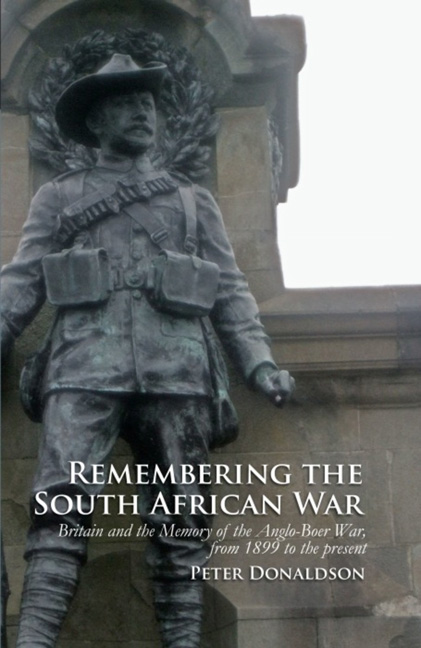 Remembering the South African War
Remembering the South African War Book contents
- Frontmatter
- Dedication
- Contents
- List of Illustrations
- Acknowledgements
- Introduction
- 1 Civic War Memorials: Public Pride and Private Grief
- 2 Pro Patria Mori: Remembering the Regiment
- 3 Vitai Lampada: Remembering the War in Schools
- 4 Alternative Affiliations: Remembering the War in Families, Workplaces and Places of Worship
- 5 Writing the Anglo-Boer War: Leo Amery, Frederick Maurice and the History of the South African War
- 6 Filming the War: Television, Kenneth Griffith and the Boer War
- Conclusion
- Bibliography
- Index
Introduction
- Frontmatter
- Dedication
- Contents
- List of Illustrations
- Acknowledgements
- Introduction
- 1 Civic War Memorials: Public Pride and Private Grief
- 2 Pro Patria Mori: Remembering the Regiment
- 3 Vitai Lampada: Remembering the War in Schools
- 4 Alternative Affiliations: Remembering the War in Families, Workplaces and Places of Worship
- 5 Writing the Anglo-Boer War: Leo Amery, Frederick Maurice and the History of the South African War
- 6 Filming the War: Television, Kenneth Griffith and the Boer War
- Conclusion
- Bibliography
- Index
Summary
THE South African War has spawned a substantial bibliography covering an extensive range of aspects and topics. In Britain, the historiography was reinvigorated in the late 1960s when the conflict was rediscovered after years of neglect in such works as T. C. Caldwell's edited collection, The Anglo-Boer War: Why Was it Fought? Who Was Responsible? A second significant landmark came in 1972 when Richard Price's An Imperial War and the British Working Class: Working-class Attitudes and Reactions to the Boer War, 1899–1902, was published. This work was part of a new generation of histories which attempted to break away from the high political and military assessments to studies of popular perceptions of the conflict. Such studies did not, however, mark the end of the grand, narrative histories, for in 1979 Thomas Pakenham's hugely influential study, The Boer War, was published. A year later the broadening out of South African War studies was confirmed in Peter Warwick's edited collection, The South African War: The Anglo-Boer War, 1899–1902, which contained essays on a diverse range of issues including women and the war, the poetry of the war and the role of black people in the conflict. Unsurprisingly, the centenary anniversaries brought forward a fresh spate of work. Much of this built upon and extended the earlier trend in which the forgotten voices and discourses were subjected to close attention. This approach was encapsulated in Cuthbertson, Grundlingh and Suttie's edited collection, Writing a Wider War: Rethinking Gender, Race and Identity in the South African War, 1899–1902. However, there remains an important gap in research in the form of the conflict's memorialisation in Britain. Almost nothing has been written on this subject; by contrast, there is much work on the memory of the war in South Africa and the participating Dominions of Australia, Canada and New Zealand.
The experience of the South African War sharpened the desire to commemorate and remember for a number of reasons. The combination of an increasingly literate public and a burgeoning populist press embedded the war firmly in the British national consciousness.
- Type
- Chapter
- Information
- Remembering the South African WarBritain and the Memory of the Anglo-Boer War, from 1899 to the Present, pp. 1 - 10Publisher: Liverpool University PressPrint publication year: 2013


